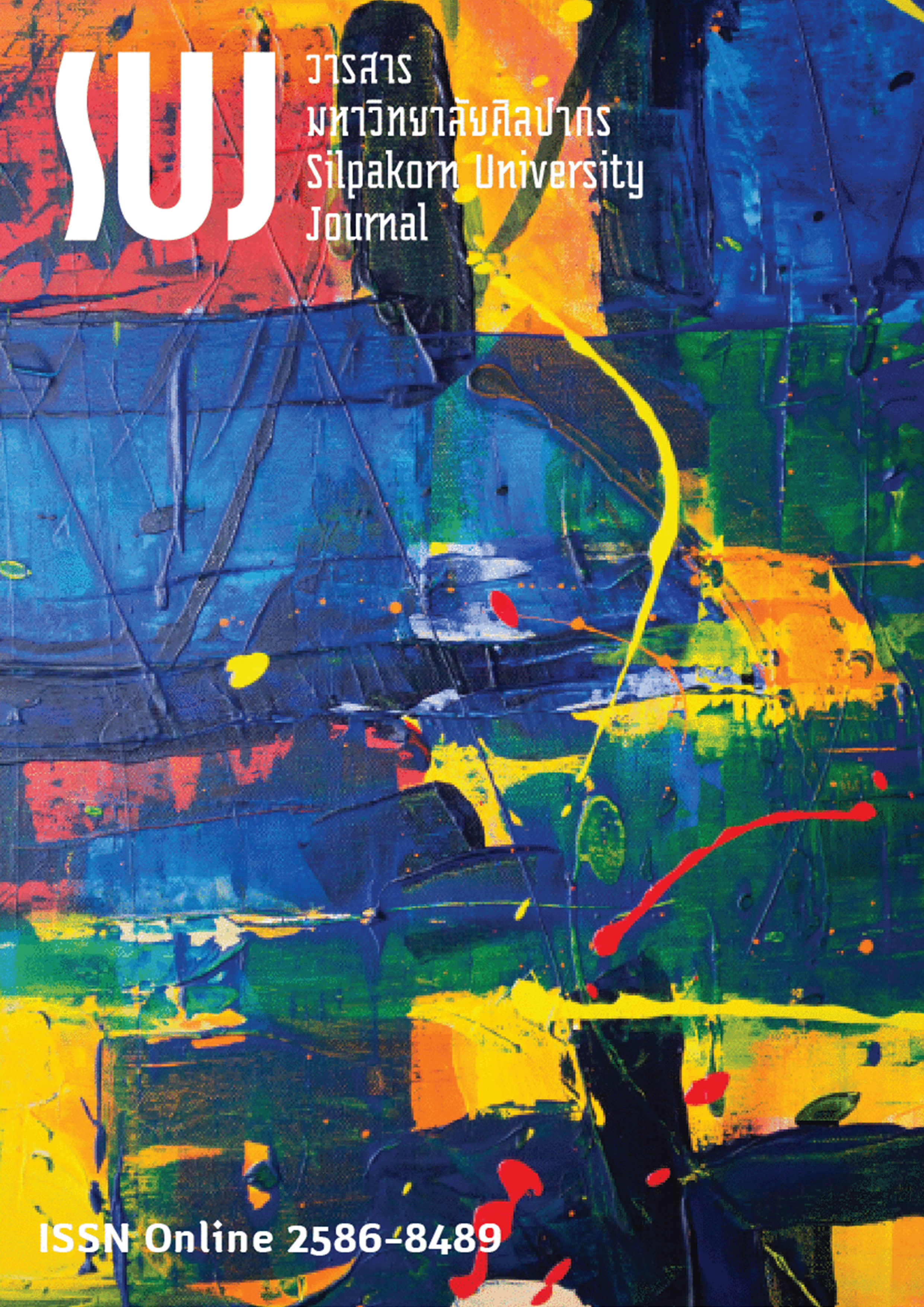แนวทางในการประยุกต์ใช้แนวคิดของดาลโครซเพื่อพัฒนาทักษะทางดนตรีขั้นพื้นฐานของนักศึกษาสาขาการศึกษาปฐมวัย (Guidelines for applying Dalcroze’s concepts to the development of basic music skills in early childhood education students)
Main Article Content
Abstract
บทความนี้มีจุดมุ่งหมายเพื่อนำเสนอแนวทางในการประยุกต์ใช้แนวคิดของดาลโครซใน การพัฒนาทักษะทางดนตรีขั้นพื้นฐานของนักศึกษาสาขาการศึกษาปฐมวัย ใน 3 ประเด็น อันได้แก่ 1. วิเคราะห์ปัญหาเกี่ยวทักษะทางดนตรีขั้นพื้นฐานของนักศึกษา 2. การเลือกวิธีการการสอนดนตรีที่เหมาะสมในการพัฒนาทักษะทางดนตรีขั้นพื้นฐานสำหรับนักศึกษา 3. ออกแบบกิจกรรมที่เหมาะสมในการพัฒนาทักษะทางดนตรีขั้นพื้นฐานสำหรับนักศึกษา โดยมีขั้นตอนการศึกษาแยกเป็น 3 ประเด็นประกอบด้วย ประเด็นที่ 1 วิเคราะห์ปัญหาเกี่ยวทักษะทางดนตรีขั้นพื้นฐานของนักศึกษา มี 2 ขั้นตอน ได้แก่ 1. ศึกษาภูมิหลังโดยการสอบถามผู้สอนรายวิชาที่เกี่ยวข้องที่นักศึกษาเคยเรียน 2. สอบถามข้อมูลประสบการณ์ทางดนตรีของนักศึกษาโดยตรง ประเด็นที่ 2 การเลือกวิธีการการสอนดนตรีที่เหมาะสมในการพัฒนาทักษะทางดนตรีขั้นพื้นฐานสำหรับนักศึกษา มี 3 ขั้นตอน ได้แก่ 1. สืบค้นงานวิจัยที่เกี่ยวข้อง 2. นำเสนอข้อมูลวิธีการสอนดนตรีในการพัฒนาทักษะทางดนตรี 3. คัดเลือกวิธีการที่เหมาะสมในการพัฒนาทักษะทางดนตรีขั้นพื้นฐาน ประเด็นที่ 3 ออกแบบกิจกรรมที่เหมาะสมในการพัฒนาทักษะทางดนตรีขั้นพื้นฐาน มี 4 ขั้นตอน ได้แก่ 1. สร้างกรอบแนวคิดในการจัดกิจกรรมพัฒนาทักษะทางดนตรีขั้นพื้นฐาน 2. สร้างแผนกิจกรรมพัฒนาทักษะทางดนตรีขั้นพื้นฐาน 3. ทดลองตามแผนกิจกรรมพัฒนาทักษะทางดนตรีขั้นพื้นฐาน 4. สรุปผลจากกิจกรรมพัฒนาทักษะทางดนตรีขั้นพื้นฐาน ผลการศึกษาแนวทางในการประยุกต์ใช้แนวคิดของดาลโครซเพื่อพัฒนาทักษะทางดนตรีขั้นพื้นฐานของนักศึกษา พบว่า แนวคิดทางดนตรีของดาลโครซมีความเหมาะสมกับการพัฒนาทักษะทางดนตรีขั้นพื้นฐานสำหรับนักศึกษาปฐมวัย เพราะเน้นการสอนสาระดนตรีผ่านการเคลื่อนไหว โต้ตอบเสียงดนตรีที่ฟังอย่างรวดเร็ว ผู้เรียนจึงมีทักษะการเคลื่อนไหว ทักษะการฟัง ทักษะการสร้างสรรค์ สามารถสร้างสรรค์ผลงานทางดนตรีได้ดี นักศึกษาสามารถนำไปใช้ในกิจกรรมเคลื่อนไหวและจังหวะได้
This article aims to present an approach to applying Dalcroze’s concepts to the development of basic music skills in early childhood education students. The study is divided into three issues. The first issue is an analysis of problems relating to students’ basic music skills. There are two steps which are a study of students’ musical experiences and background through interviewing with their previous teachers and a direct inquiry about students’ musical experiences. The second issue is about a selection of the appropriate music teaching methods to develop students’ basic music skills. This can be done in three steps as follows: finding relevant research studies, presenting information on music teaching methods, and choosing the appropriate methods. The third issue involves designing suitable activities to develop basic music skills. There are four processes: 1) create a conceptual framework for organizing activities, 2) create an activity plan, 3) experiment with the activity plan, and 4) summarize results from basic music skills development activities. The study found that Dalcroze’s musical concepts were suitable for the development of early childhood students’ basic music skills because his methods focused on teaching music through movements and active listening. Students, therefore, had motor, listening, and creative skills and were able to create good musical works. In addition, they could apply these skills to movement and rhythmic activities.
Downloads
Article Details

This work is licensed under a Creative Commons Attribution-NonCommercial-NoDerivatives 4.0 International License.
References
Buasri, Phatthiya. (2014). Analysis of song and rhyme usage of preschool teachers (การวิเคราะห์การใช้เพลงและคำคล้องจองของครูอนุบาล). An Online Journal of Education, 9(1): 768-782.
Niyomsuk, Mathawee. (2019). The Music Learning Management Based on Dalcroze’s Concept to Develop Music Practical Skills for Early Childhood (การจัดการเรียนรู้วิชาดนตรีสากล ตามแนวคิดของดาลโครซเพื่อพัฒนาทักษะการปฏิบัติทางดนตรี สำหรับเด็กปฐมวัย). Master’s dissertation, Dhurakij Pundit University, Bangkok, Thailand.
Promsukkul, Preeyanun. (2018). The guidelines for developing early childhood music learning in non-formal private school setting (แนวทางการพัฒนาการจัดการเรียนรู้ดนตรีสำหรับเด็กปฐมวัยในโรงเรียนดนตรีเอกชนนอกระบบ). Veridian E-Journal, Silpakorn University (Humanities, Social Sciences and Arts), 11(2): 1266-1283.
Suttachitt, Narutt. (1997). Music Activities for Teachers (กิจกรรมดนตรีสำหรับครู) (3rd ed.). Bangkok: Chulalongkorn University Press.
Trachoo, Kasemsan. (2021). The Development of Musical Learning Activities According to Base on Dalcroze Structural Model for Prathomsuksa 4 Students (การพัฒนากิจกรรมการเรียนรู้ทักษะทางดนตรีตามแนวคิดของดาลโครซ สำหรับนักเรียนชั้นประถมศึกษาปีที่ 4). Master’s dissertation, Mahasarakham University, Mahasarakham,Thailand.


